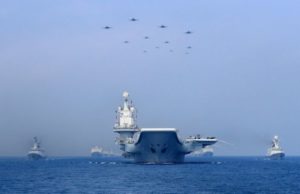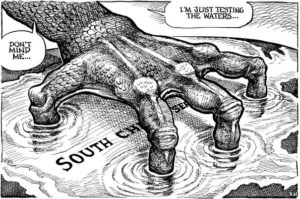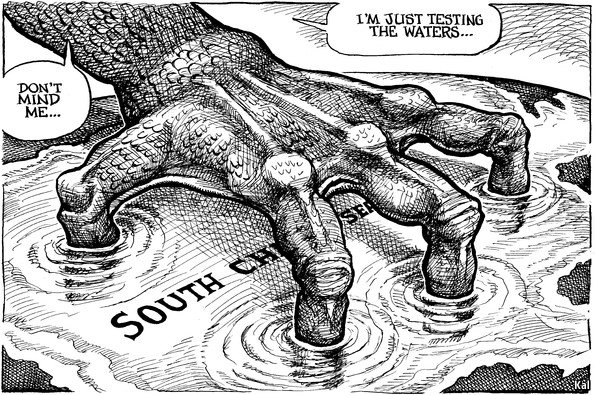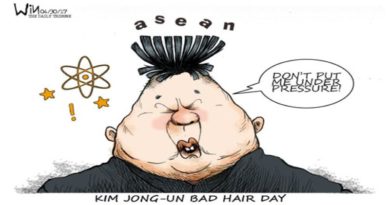THE DAILY PLANET: China’s aggression amid global crisis

China is contesting for control, not of the high seas like Germany in World War I or Japan in World War II, but of the marginal seas and skies of Asia, even while the United States remains dominant on the high seas of the Pacific.



.
China’s aggression amid global crisis
The world continues to struggle with how to contain the transmission and mitigate the effects of the coronavirus pandemic. More than 416,000 people worldwide are reported to have died from COVID-19, and more than 7.3 million confirmed positive cases have been recorded so far.
World Health Organization (WHO) officials have explained that the coronavirus may become just another endemic virus in our communities, and may never go away. There are also other illnesses such as measles that are still here despite the availability of vaccines to prevent them. It is therefore imperative that countries provide long-term plans to boost the resilience of their economies to cope with the pandemic.
.

However, while COVID-19 has stalled many of the global activities and disrupted the way of life of majority of the world’s population, China has actively continued its expansionist agenda in the West Philippine Sea. International experts are wary about China’s aggression in the disputed waters, and see a paradox in its apparent generous support to countries hit hard by the pandemic as well as its advocacy for global coordination in managing the outbreak.
.
On April 2, a Chinese vessel allegedly rammed and sank a Vietnamese fishing boat with eight people on board near the Paracel islands. China claimed the Vietnamese fishing vessel refused to leave the area after a Chinese Coast Guard Ship had ordered it to do so. Vietnam rejected China’s claim and lodged a diplomatic protest against Beijing.
.

On April 16, China’s Haiyang Dizhi 8 survey ship reportedly entered waters near Malaysia. The next day, the ship was seen close to the West Capella oil exploration vessel operated by Malaysia’s oil company, Petronas. Malaysia’s foreign minister Hishammuddin Hussein called for disputes in the strategic waterway to be resolved “peacefully.”
China’s confrontational moves are not unprecedented and are very consistent with Chinese statecraft that relies on the exploitation of any strategic opportunity to expand geopolitical interests relative to other claimant states in the disputed waters.
.

A year ago, the Philippines had a similar experience with Chinese aggression when some 22 Filipino fishermen almost died after a Chinese fishing vessel rammed and sank a wooden Filipino fishing boat, the F/B Gem-Ver 1, then anchored at Reed Bank. After the collision, the Chinese vessel turned off its signal lights and sailed away as the Filipino boat sank. The Chinese foreign ministry issued a dismissive statement that called the June 9 Reed Bank incident “an ordinary maritime traffic accident.”
Former Supreme Court senior associate justice Antonio Carpio argued that no ordinary Chinese fishing vessel would engage in the ramming of other fishing boats for fear of inflicting damage to their own vessel. According to him, a Chinese maritime militia (CMM) vessel probably sank the Filipino boat, since it has a reinforced steel hull designed for ramming fishing vessels of other coastal states in the South China Sea.
The CMM’s purpose is to keep Chinese aggression alive at sea, but below the level of naval operations. It uses a civilian facade to hide behind the cloak of deniability.
“Their aim is to fulfill their expansionist agenda,” said former foreign secretary Albert del Rosario in an interview in Foreign Policy Magazine. “They obviously have one. It is both economic and military. It’s economic because there is now competition in the world for resources. It is military because they are trying to establish defense corridors. They want to be a maritime power but to be that, you need your own lake… I think the international community should be vigilant about what is happening in the South China Sea because it has the potential to change the international order.”
.

Amid the global pandemic, the Philippines must keep its guard up. We must enforce our territorial integrity in the West Philippine Sea and defend our maritime rights in accordance with international law.
While there is a global initiative to defeat COVID-19, which is an invisible foe, there must likewise be a united stand to promote a rules-based order. We should not be blindsided by China’s aggression and expansionism as we cope with the pandemic.
Dindo Manhit is founder and managing director of Stratbase Group.
.


SIGN UP TO RECEIVE OUR EMAIL
.
The most important news of the day about the Earth and the Universe.
email us: [email protected]
6.10.2020










